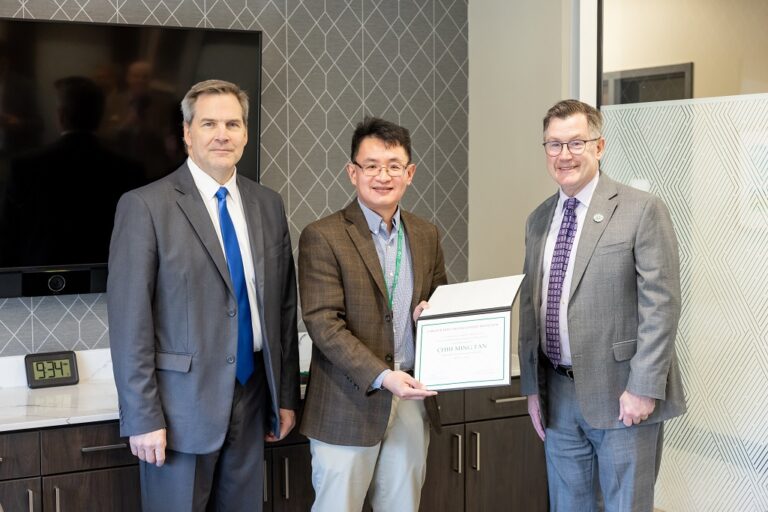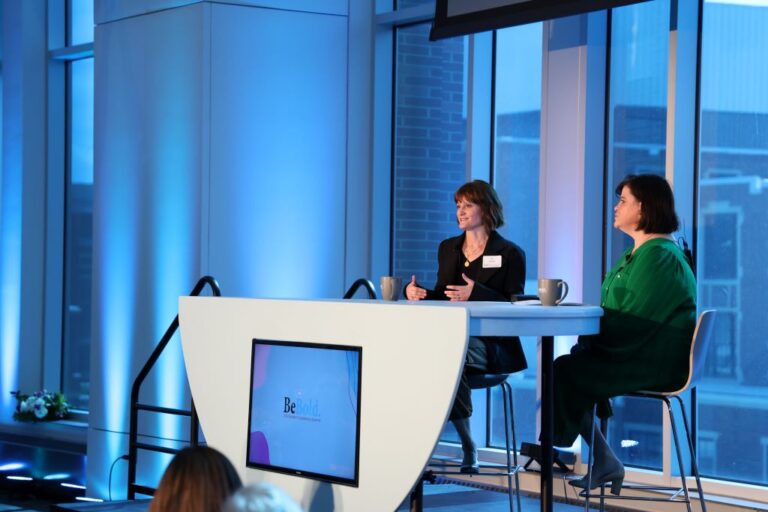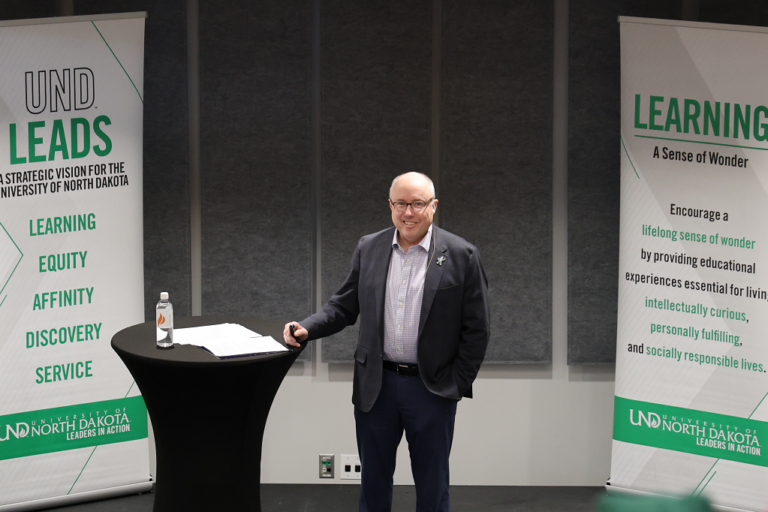A guide to addiction and substance-abuse services at UND
To mark National Recovery Month, campus experts detail ways in which students, faculty and staff can find help

As September ends, so does National Recovery Month – a recognition of treatment, healing and recovery practices for those affected by substance abuse and addiction, as well as the counselors and stakeholders contributing to recovery efforts.
But the end of the month doesn’t mean that help is going away. Quite the opposite, UND experts say: guidance, counseling and a helping hand are available to the University community year-round.

By way of this UND Today story, we hope to inform the community of ways in which they can seek help for themselves, or others close to them who might be struggling with substance abuse, addiction and other related issues.
For Assistant Professor Isaac Karikari, director of the social work master’s program, one of the biggest roles for a national observance is to break down the barriers of stigma surrounding the discussion of such issues.
“Substance abuse disorders and similar illnesses are something that kill people silently,” said Karikari, who is currently researching the intersection of homelessness, substance use and mental health. “But if we have the conversations or discussions more frequently, what we’ll be doing is easing the tensions and increasing peoples’ comfort in opening up about the challenges they face.”

And to Kim Miller, associate project director for the Mountain Plains Addiction Technology Transfer Center housed at UND, her career’s worth of experience in treating these types of disorders tells her that recovery works, and taking the crucial steps toward recovery can change lives.
“I have seen what I would consider miracles, as far as how much someone has been able to recover, change and lead fulfilling lives,” Miller said. “What keeps me going in this profession is that recovery is possible. It’s not easy, but you don’t even know how much it can change your life to take that step.
“There are so many different options available, whether you do it on your own or through a professional, licensed treatment program. But it’s easier to do it with the help of somebody who is experienced with that path, who understands what’s going on as well as the potentials of recovery.”

Contact the University Counseling Center
At UND, help is especially close by for students. As noted by both Karikari and Miller, the University Counseling Center – located in McCannel Hall – is open to all enrolled students, and it’s an important resource to keep in mind for those who interact with UND’s student body on a regular basis, including faculty and staff.
Karkari shared data from the American College Health Association as recently as 2018 that showed as many as 82 percent of UND students have used alcohol at some point in time, and 63 percent had used alcohol within the past nine days, prior to taking the survey. Of those 20 years old and younger, about 52 percent had used within nine days.
One of the reasons this older data is of interest is due to the fact that researchers of substance use have discovered an increase in consumption of drugs and alcohol through the pandemic. Several studies have suggested an increase as a result of COVID-related stress, Karikari said. A statewide COVID-19 survey found a 19 percent increase in alcohol use, and those 26 and younger reported a 35 percent increase. Karikari also noted an increase in other substance use cases, including drug overdose deaths in North Dakota.
“With what we know about students’ use of alcohol, about the emerging trends nationally and globally due to COVID-19 and what the statewide survey indicates, it is important that preventative and proactive actions are taken,” Karikari said.

Carolyn Broden, assistant director of substance use and outreach at the University Counseling Center and a licensed addiction counselor, said her line is open for those with concerns. And students can contact the Counseling Center if they themselves want to speak with an addiction counselor or learn more about substance use.
The Counseling Center website contains more information about the services offered, which also includes a peer support group for substance use – a service that doesn’t require being a current client of the Counseling Center to attend.
“A big barrier for students seeking help can be their parents finding out that they’re struggling with their mental health or substance use,” Broden said. “That doesn’t have to be the case, since our services are already provided for through student fees, not individual insurance.”
Broden also pointed to the fact that UND’s counselors are available to offer sessions remotely, in addition to in-person consultation. UND has also recently launched a wellness app, which is available to students, faculty and staff and is free to use. Broden said the app contains a lot of great resources regarding mental health and substance use.
“People are more than welcome to call us and ask about our resources, what the process looks like, and I’d be happy to answer those questions,” Broden said. “Something I say is, ‘What do you have to lose by sitting down and talking to someone in a safe and confidential space for 50 minutes?’
“There are a lot of opportunities to begin working towards living a happier and healthier life, and that first step might just be walking through the door at an agency like ours to get help.”

Help is closer than you think
Broden’s encouragement can apply to UND’s hundreds of faculty and staff members, as well, though they won’t be able to receive services directly from the University Counseling Center.
That said, UND connects to counseling and recovery services by way of The Village, the University’s Employee Assistance Program provider. Broden said that those with questions on seeking services via the EAP can talk with Kristi Kuntz, case manager and community liaison for the University Counseling Center.
“She’s amazing and would be more than willing to help assist staff and faculty in the process of finding resources outside of UND, or even just help with that first phone call to The Village for services,” Broden said.
Noting additional ways in which members of the UND community can take steps toward recovery, Miller pointed to North Dakota’s Regional Human Service Centers located in eight cities across the state, including in Grand Forks. And if those centers don’t provide the services needed, she said, they’ll have connections to community-based providers.
“And in the eastern half of the state, we’re fairly fortunate to have private providers that offer recovery-based services on an outpatient basis, and Fargo has residential facilities for people needing an intense level of care,” Miller said.

Through her role at the Addiction Technology Transfer Center (ATTC), Miller has been organizing and providing training for addiction, substance use and mental health professionals across a six-state region. The goal of the organization, which operates under the Substance Abuse and Mental Health Services Administration, is to provide evidence-based knowledge in the field of substance use disorders.
Miller also spent a long portion of her career working at the Northeast Human Service Center as a primary counselor for a women’s addiction treatment program, before coming to work at her alma mater and the ATTC.
“Recent statistics in the state have shown that overdoses and deaths tied to substance abuse are already past what was recorded in 2020,” Miller said. “It’s something that we want to continue educating the public on.”
She went on to say that Narcan (the naloxone nasal spray used to treat overdose victims) is now widely available, including being carried by Grand Forks police officers, which is a tremendous change from the previous decades of her field work. It’s also looking like there is more potential funding on the way for the Grand Forks region, she said, when it comes to treating substance use disorders in the community.
“But there’s still a lot of stigma regarding alcohol, drug abuse and substance use disorders, which is really too bad because there are so many people being affected by these disorders,” Miller remarked. “It’s really hurtful to hear some of the disparaging comments for family members and those suffering from the disease.”
From her perspective, continuing to talk about these issues can help improve the statistics. For example, only 18 percent of people who have substance use disorder will seek treatment, which leaves nearly 80 percent of the population with a disorder without help of any kind, Miller said.
“So, National Recovery Month and getting something out there, encouraging the conversation, is definitely a first step to reducing that stigma,” Miller said. “One person with a substance use disorder impacts a minimum of 10 people – whether they’re living with them, they’re friends or coworkers. People are not isolated in their disease.”
And in that statement lies an important point: nobody is alone in their struggle. Miller encourages people to seek out what can work best for them, whether it’s a clinical consultation or enrollment in a 12-step support group, such as Alcoholics Anonymous. Such groups are sometimes the only service available to rural communities.
“As I said, recovery works, and getting into a place of recovery can change your life dramatically,” Miller said. “There are a lot of options out there for those who want to take that step.”
Suicide Prevention Awareness Month is also in September, and as President Armacost wrote in his recent letter to campus: “Please, talk to someone. Make a call. Get the help you need. Your health and wellbeing is important to us.”
If you or someone you know is in an emergency, call The National Suicide Prevention Lifeline at 800-273-8255 or call 911 immediately.



